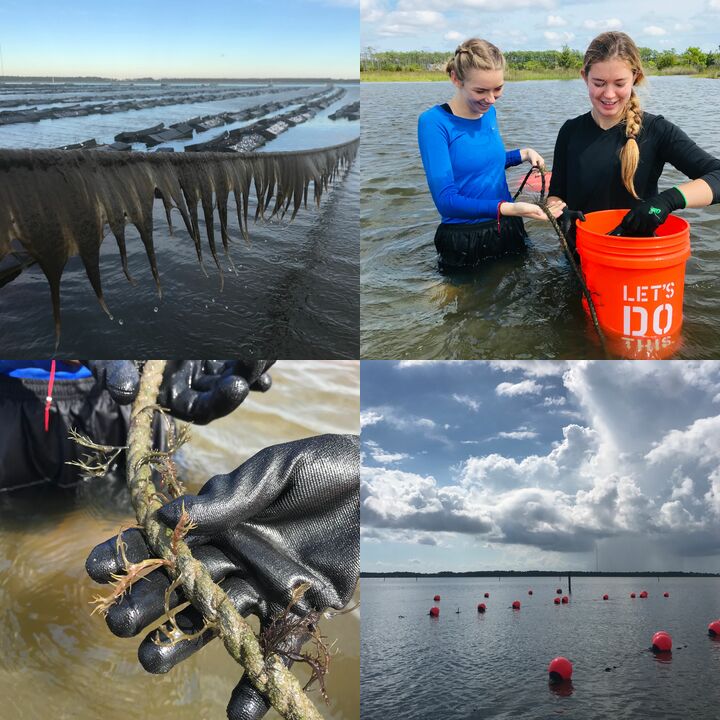Phyta - Sustainable Seaweed
The Problem
Climate change portends a grave threat to the planet’s health and vitality. If the rate of greenhouse gas emissions remains constant, a recent IPCC report concluded that food shortages, mass droughts, and increased poverty will be exacerbated. To avoid catastrophic warming, greenhouse gas emissions must be quickly and dramatically reduced by 2040 (https://www.ipcc.ch/sr15/). To address this challenge, the international community has launched carbon-trading markets wherein credits could be as valuable as $27,000 per ton of carbon dioxide removed by 2100 (https://www.nytimes.com/2018/10/07/climate/ipcc-climate-report-2040.html). While these credits will help mitigate the growing climate crisis, they are limited to land-based applications – failing to capitalize on the capacity of the ocean to absorb carbon. Concurrently, traditional agriculture releases 180 million metric tons of nitrogen and phosphorus into the marine environment annually. These pollutants have caused over 245,000 square kilometers of “dead zones.” Marine deserts impose severe economic impacts and threaten the health of the planet’s ecosystems. Finally, increasingly destructive storms and flooding events are projected to cost the U.S. over $1 trillion in damage (Fourth National Climate Assessment). As a side effect of property loss and real estate erosion, coastal communities that depend on the marine environment will become economically unstable to the extent to which they risk being dispersed entirely.
Our Proposal
To address growing food security risks, widespread estuary pollution and ocean habitat degradation, Phyta is devoted to sustainably cultivating seaweed in temperate coastal waters. By collaborating with local fishermen and oyster farmers, Phyta intends to offer an alternative ingredient for consumer products while supporting local employment and economic growth. Furthermore, Phyta is crafting a protocol for carbon sequestration and agricultural pollution absorption that engages underemployed shellfish farmers along the coastal United States. Phyta will provide a turnkey growing system to farmers, as well as facilitate marketing and sales. The business model and service protocols are designed to support economic development in coastal communities and increase the production of seaweed worldwide. In light of the versatility of seaweed and its potential use in consumer products, our organization is in the process of engaging a variety of partners that will integrate seaweed into personal hygiene commodities, animal feed supplements, and biodegradable plastic materials. Furthermore, becoming a leading supplier of environmental remediation credits will allow us to encourage commercial scale seaweed cultivation on a national and international scale. Armed with the protocols necessary to become an accredited seller of these credits, Phyta will enhance the economic feasibility of seaweed cultivation – thereby helping to build a market for sustainable products.
We Assume that...
Existing commercial-scale processing techniques become increasingly efficient and cost effective. We expect that they will increase in accessibility –further encouraging seaweed cultivation.
Anticipate growing consumer interest in sustainable products. These products could affect a variety of industries such as personal hygiene, cosmetics, or fashion.
Eventually expect more strict regulations associated with agricultural pollution and nutrient runoff, as well as mandated reductions in carbon dioxide emissions.
Phyta also anticipates a larger interest and enthusiasm from fisher and oystermen who would want to engage in seaweed cultivation as a means of generating supplemental income.
Increased demand for reductions in marine pollution due to changes in consumer behavior that encourage companies to behave more responsibly with respect to the environment.
Constraints to Overcome
Although seaweed cultivation has been practiced for many centuries, the Western Hemisphere has remained disengaged in the industry’s development. In recent decades, however, various studies have demonstrated seaweeds capacity to serve as an alternative ingredient for consumer products, animal feed supplements, or biofuels. As a result of its versatility, various organizations in the U.S. have become interested in commercial-scale seaweed cultivation. Even so, farming efforts have been traditionally isolated to cold waters. By designing a structure that is adaptable to a variety of coastal climates, Phyta will begin to address the supply gap for seaweed. Phyta will also improve the economic feasibility of seaweed cultivation by encouraging the sale of environmental remediation credits. In removing geographic constraints associated with seaweed cultivation while offering a more substantial revenue source, Phyta has the opportunity to radically support planetary health.
Current Work
In the months ahead, we must accomplish a series of goals to move the venture from a pilot to a commercial stage. Among the most pressing is the development of a strategy to quantify the environmental remediation through seaweed cultivation. Working with Duke University, as well as other members of the academic and business communities who have experience in protocol development, our team expects to finalize the draft of a protocol for carbon, nitrogen, and phosphorus removal inherent to seaweed production. We also expect to acquire seed funding that would serve to finance the installation of commercial-scale farms. To that end, we are in preliminary conversations with individuals at the North Carolina Department of Environmental and Natural Resources to acquire the permits that will be necessary to expand our operations. Finally, we will engage local aquaculturists who are interested in integrating seaweed into their existing operation as a supplemental source of income.
Current Needs
As we continue to bring this venture forward, Phyta would hopes to engage individuals with expertise in coastal ecosystem services management, coastal oceanography, and environmental engineering. We would also be grateful to learn from experienced environmental grant writers. At the same time, we are seeking approximately $250,000 over fourteen months to allow for the installation of a network of farms in North Carolina. This seed capital would also provide funding for various operating costs, such as labor and permitting, along with continued research and development. Finally, the Phyta team is looking to collaborate with similarly ambitious entrepreneurs working in sustainable aquaculture or oyster farming. By becoming part of a community that recognizes the potential economic and social development opportunities associated with the marine environment, our team would acquire the skills, confidence, and potential collaborating partners necessary to fully realize our venture.
